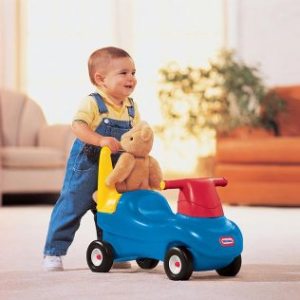 Toddlerhood is a time of transition. Not only for the toddler, but for the parents too. One of the biggest transitions that need to be made is the move from being a dependant baby to a more independent child. Toddlers learn to assert themselves, have their own likes and dislikes and become distinct entities separate from their parents. Along with this they also need to learn how to begin doing more for themselves. Parents need to learn this too. It is far too easy to continue doing everything for your little one, from dressing them, to cleaning up their toys after play, to fetching them their snacks and taking cups and plates to the kitchen.
Toddlerhood is a time of transition. Not only for the toddler, but for the parents too. One of the biggest transitions that need to be made is the move from being a dependant baby to a more independent child. Toddlers learn to assert themselves, have their own likes and dislikes and become distinct entities separate from their parents. Along with this they also need to learn how to begin doing more for themselves. Parents need to learn this too. It is far too easy to continue doing everything for your little one, from dressing them, to cleaning up their toys after play, to fetching them their snacks and taking cups and plates to the kitchen.
How to encourage independence in toddlers
Fostering independence starts with setting up your home and your parenting style in such a way that you encourage your child to do things for herself . Toddlers will be more inclined towards independence when their environment presents them with opportunities to do things for themselves. Try these ideas:
- Place toys in an easily reachable place and have them organised in such a way that they are relatively easy to pack away. For example, have a box with all the blocks, a box for dolls, a box for dress ups and a box for craft. If it is easy to organise your little one will pack it away with less fuss.
- Position your toddler’s cups, plates and utensils in a cupboard or drawer that is easily accessed by your child. You could also place healthy snacks on a lower shelf in the pantry or fridge so that they are able to reach for their own food when the need arises. Instead of getting you to fetch it, next time your toddler requests something to eat you could encourage them to fetch their own snack and bowl under supervision. When they are finished, encourage them to take the bowl back to the kitchen.
 How to encourage independence in toddlers
How to encourage independence in toddlers
Fostering independence and allowing your child to do more for himself is one of the challenges parents and toddlers face. The following ideas can help:
- Choose clothing and shoes that are easy to put on. For example, shorts or skirts with an elastic waistband that can be pulled up, and stretchy t-shirts as opposed to shirts with buttons. Your toddler will likely still require assistance with dressing but being able to do some of it themselves will boost their confidence and desire to keep practising.
- Your toddler will continue to require assistance with some things such as toileting for a while yet, but you can help them gain confidence in this area with things such as a small step or toddler toilet seat they can use to get onto the toilet themselves. You can also start teaching them about the use of toilet paper, showing them how to take 1-2 pieces off at a time under supervision (quick tip: if you face the roll toward the wall it is less likely to unravel).
- Encourage your child to make some choices within appropriate limits. For example, offer your child two options for breakfast, or two choices of t-shirt to choose from. This allows you to decide what options are acceptable/realistic, your child to have some control over a situation and express their opinion, and reduces the potential for your child to feel overwhelmed by too many choices. Being able to have some say (even on the small things) in our daily lives helps boost a child’s confidence, decision making skills, and self esteem.
- Encourage your toddler to help you with chores around the house. Kids love to mimic adults, and it is a great way for them to learn some daily living skills, spend time with you, and feel they are making a contribution to the household.
It can be difficult for parents to relinquish some of the responsibilities of daily tasks with your little one, but finding a balance where both you and your toddler can participate will ease the transition.
For more information you can visit: www.changespsychology.com.au
